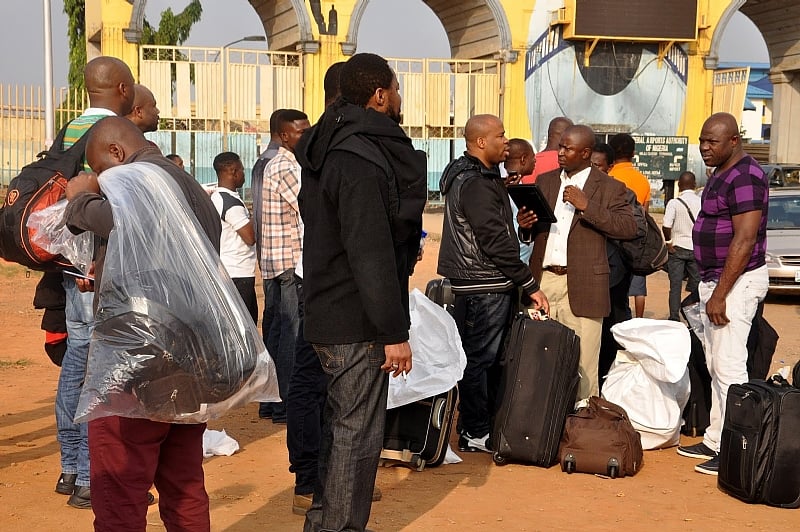Eleven West African nationals, deported from the United States and currently detained in Ghana, have initiated legal proceedings against the Ghanaian government, claiming unlawful detention and a violation of their fundamental human rights. The group, comprising citizens of Nigeria, Liberia, Togo, Gambia, and Mali, filed two urgent applications with the Labour Division of the High Court in Accra. The first seeks an interim injunction to prevent their deportation to their respective home countries, while the second is a writ of Habeas Corpus, demanding the state present them before the court and justify the legal basis for their continued confinement. Their lawyer, Oliver Barker-Vormawor, stressed the urgency of the situation, emphasizing the lack of lawful grounds for their detention. The court has scheduled a hearing for September 23, 2025, to address these urgent applications.
The core of the applicants’ argument centers on the alleged arbitrary nature of their detention and the violation of their constitutional rights. They assert that President John Dramani Mahama and the Foreign Affairs Minister have already publicly announced their intended deportation, a move they contend preempts due process and judicial oversight. The applicants claim their detention breaches Article 14(1) of the Ghanaian Constitution, which guarantees personal liberty, and Article 23, which ensures administrative justice. Further, they argue the state’s actions violate the principle of non-refoulement, a cornerstone of international law prohibiting the return of individuals to countries where they face a credible risk of persecution, torture, or other inhumane treatment.
The applicants’ affidavits detail a clandestine and distressing journey from U.S. detention centers to Ghana. They allege being forcibly removed between September 5 and 6, shackled during transport, and flown to Ghana without any explanation regarding the reasons for their deportation or their destination. Upon arrival, they were handed over to Ghanaian authorities and confined in what they believe to be a military facility, denied access to legal counsel and due process. This lack of transparency and procedural fairness underscores their claims of arbitrary detention. Their legal team maintains that this treatment contravenes both domestic and international legal standards, highlighting the vulnerability of individuals caught in the complexities of international immigration and deportation processes.
The legal team representing the deportees emphasizes the violation of international agreements, specifically the Convention Against Torture. They argue that at least eight of the eleven individuals had previously been granted “Withholding of Removal” or “Deferral of Removal” status in the U.S. under this convention. This status is granted to individuals who demonstrate a credible fear of torture should they be returned to their home country. The lawyers argue that Ghana’s acceptance and subsequent detention of these individuals, despite their protected status under the Convention Against Torture, constitutes a breach of international law and puts these individuals at grave risk. The lawyers further contend that Ghana, as a signatory to international human rights conventions, is obligated to uphold these protections.
The applicants are seeking the court’s intervention to safeguard their fundamental human rights, as guaranteed by both the Ghanaian Constitution and international law. They specifically invoke Article 33(1) of the Constitution, which empowers the High Court to enforce fundamental human rights and freedoms. They request an order for their immediate release from detention, arguing that their continued confinement is unlawful and infringes upon their basic rights. The upcoming hearing on September 23rd will be a crucial juncture in this case, determining whether the court will grant the interim injunction to halt their deportation and the writ of Habeas Corpus to examine the legality of their detention. The outcome will have significant implications for the protection of human rights within Ghana and the adherence to international legal obligations regarding the treatment of deportees and asylum seekers.
The case highlights the complex legal landscape surrounding international deportations and the challenges faced by individuals caught in these processes. The applicants’ allegations of clandestine transfers, lack of due process, and disregard for international protections raise serious concerns about the handling of deportations and the potential for human rights violations. The High Court’s decision will be a pivotal moment, not only for the eleven individuals seeking justice but also for setting a precedent for future cases involving deportees and the protection of their fundamental rights in Ghana. The case underscores the crucial role of the judiciary in upholding human rights principles and ensuring the adherence to both national and international legal obligations, especially in cases involving vulnerable individuals facing potential harm and persecution.


